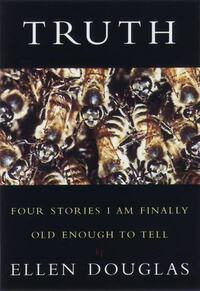Take a photo of a barcode or cover
SELECTED FOR RE-READ 2023 - just as lovely the second time around. Determined to find and read her fiction!
Original Review
Before finding this book, I'd never heard of this southern author, who apparently draws heavily from her long family history for her fiction. I chose the book from the biography shelves based on the lovely snippet of prose on the back cover.
Part memoir, part contemplative musings, partly an exploration of southern history and a southern family's history...a dense, lush, marvelous reading experience!
Lovely writing, and beautifully puzzling in its construction. I loved this book so much, I will likely read it again (after finding and reading some of her fiction, perhaps.)
Original Review
Before finding this book, I'd never heard of this southern author, who apparently draws heavily from her long family history for her fiction. I chose the book from the biography shelves based on the lovely snippet of prose on the back cover.
Part memoir, part contemplative musings, partly an exploration of southern history and a southern family's history...a dense, lush, marvelous reading experience!
Lovely writing, and beautifully puzzling in its construction. I loved this book so much, I will likely read it again (after finding and reading some of her fiction, perhaps.)
I loved every moment in this wonderful book. This Mississippi author speaks lovingly, yet with candor, of memories of families, relationships, and place. Her family’s roots in Natchez made for striking and memorable recollections. Like her, I had never heard of the horrible account of Second Creek.
This book prompted me to remember tales from my childhood as well recall some family secrets. Were I a writer, I too would have to wait for the passing of some to be able to tell the hush-hush stories.
For me, this was the perfect book at the ideal time. I highly recommend it to those who love southern literature. This was a treasure, and I hope to read the rest of Douglas’s work. I especially love that she chose to write under an assumed name so that the characters in her first book wouldn’t recognize themselves.
This book prompted me to remember tales from my childhood as well recall some family secrets. Were I a writer, I too would have to wait for the passing of some to be able to tell the hush-hush stories.
For me, this was the perfect book at the ideal time. I highly recommend it to those who love southern literature. This was a treasure, and I hope to read the rest of Douglas’s work. I especially love that she chose to write under an assumed name so that the characters in her first book wouldn’t recognize themselves.
This book of four stories is a history of the south again. She is grappling with the issues America has yet to address about racism. I applaud her writing.
(I actually own the paperback, not the hard cover book)
(I actually own the paperback, not the hard cover book)
dark
slow-paced
The concept was interesting; an author goes public with the "truths" behind the novels she's written, now that she's outlived all the family and other members of the community who might object to her revealing the stories she's picked up from them. Unfortunately, her focus on strict truth-telling limits her story-telling, since most of the "truths" she's telling are fragmentary by their very nature--for instance, her grandfather's suicide, a rarely-discussed family secret about which she never did learn the details, which tends to be the case with rarely-discussed family secrets. With so little to go on, it's difficult to find this "truth" compelling.
Perhaps the only place her absolute refusal to fudge the details did work was her final story, "On Second Creek," where her attempts to uncover the history behind the punishment of 30 slaves murdered for plotting an insurrection by a group of men which included her own ancestors is largely fruitless. In that story only, the silence of the historical record, and her inability to uncover the voices of those involved--and particularly the voices of the slaughtered men--resonates. Her framing of her mother's visceral horror at the lynching of a free black man in the 20s against her family's unquestioning admiration of their forebears, some of whom were likely complicit in something even worse, is probably the most pointed and poignant moment in the whole memoir.
Perhaps the only place her absolute refusal to fudge the details did work was her final story, "On Second Creek," where her attempts to uncover the history behind the punishment of 30 slaves murdered for plotting an insurrection by a group of men which included her own ancestors is largely fruitless. In that story only, the silence of the historical record, and her inability to uncover the voices of those involved--and particularly the voices of the slaughtered men--resonates. Her framing of her mother's visceral horror at the lynching of a free black man in the 20s against her family's unquestioning admiration of their forebears, some of whom were likely complicit in something even worse, is probably the most pointed and poignant moment in the whole memoir.
"Julia and Nellie", about the author's attempt to imagine the lives of her grandmother and other women of her generation, is diffuse and rambling in structure; the author chose to tell it rather as she pieced her knowledge together, in snatches. Both it and the preceding essay, "Grant", give a sharp sense of the people and the society, in spite of Douglas constantly foregrounding her own uncertainty about these stories -- or maybe because of it? Douglas is concerned to say no more than she knows, and to give small details when she doesn't know larger things; she's trying not to use convention or assumptions to fill in the blanks. That helps her stories not to disappear into generalities.
But this sense of seeing clearly isn't present in "Hampton", because Douglas didn't know the man she's writing about very well, and because his experiences were so distant from hers; she knows the white people in his life, but otherwise, she can only report what he told her, and a few other fragments; it's necessarily distanced.
"On Second Creek" may be the best of the essays. Its main theme is not family stories, but not telling family stories; many things are deliberately shrouded in silence. It's a thought provoking subject. The author talks about her fiction-writer's instinct to fill in details; but memoirs based on history often try to present themselves as without gaps.
But this sense of seeing clearly isn't present in "Hampton", because Douglas didn't know the man she's writing about very well, and because his experiences were so distant from hers; she knows the white people in his life, but otherwise, she can only report what he told her, and a few other fragments; it's necessarily distanced.
"On Second Creek" may be the best of the essays. Its main theme is not family stories, but not telling family stories; many things are deliberately shrouded in silence. It's a thought provoking subject. The author talks about her fiction-writer's instinct to fill in details; but memoirs based on history often try to present themselves as without gaps.




